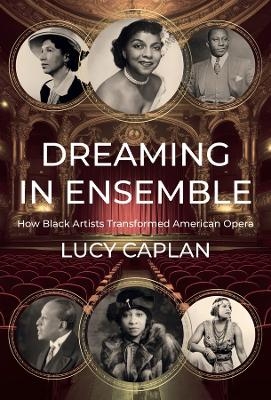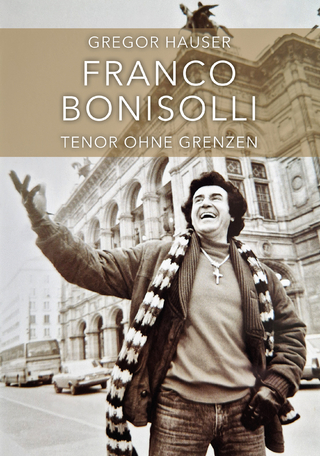
Dreaming in Ensemble
How Black Artists Transformed American Opera
Seiten
2025
Harvard University Press (Verlag)
978-0-674-26851-7 (ISBN)
Harvard University Press (Verlag)
978-0-674-26851-7 (ISBN)
Lucy Caplan explores the flourishing of Black composers, performers, and critics of opera in America during the early twentieth century. Working outside mainstream opera houses, these artists fostered countercultural forms of expression that reimagined opera as a medium of Black aesthetic and political creativity.
A revelatory new account of Black innovation in American opera, showing how composers, performers, and critics redefined the genre both aesthetically and politically in the early twentieth century.
The inauguration of a “golden age” in Black opera is often dated to 1955, when Marian Anderson became the first Black singer to perform in a leading role at New York’s Metropolitan Opera. Yet Anderson’s debut was actually preceded by a rich Black operatic tradition that developed in the first half of the twentieth century. Lucy Caplan tells the stories of the Black composers, performers, critics, teachers, and students who created this vibrant opera culture, even as they were excluded from the genre’s most prominent institutions. Their movement, which flourished alongside the Harlem Renaissance, redefined opera as a wellspring of aesthetic innovation, sociality, and antiracist activism.
Caplan argues that Black opera in the early twentieth century had decidedly countercultural ambitions. In opera’s sonic grandeur and dramatic maximalism, artists found creative resources for expressing the complexity of Black life. The protagonists of this story include composers Harry Lawrence Freeman and Shirley Graham, whose operas boldly interpreted Black diasporic history; performers Caterina Jarboro and Florence Cole-Talbert, who both starred in the racially fraught role of Aida; and critics Sylvester Russell and Nora Holt, who wrote imaginatively about the genre in the Black press. Yet Caplan also focuses on the many Black students, amateurs, opera house staff, and listeners who contributed indelibly to opera’s meanings.
With the creation of new companies, choruses, and audiences, opera not only circulated in the Black public sphere but itself became a public sphere with radical potential.
A revelatory new account of Black innovation in American opera, showing how composers, performers, and critics redefined the genre both aesthetically and politically in the early twentieth century.
The inauguration of a “golden age” in Black opera is often dated to 1955, when Marian Anderson became the first Black singer to perform in a leading role at New York’s Metropolitan Opera. Yet Anderson’s debut was actually preceded by a rich Black operatic tradition that developed in the first half of the twentieth century. Lucy Caplan tells the stories of the Black composers, performers, critics, teachers, and students who created this vibrant opera culture, even as they were excluded from the genre’s most prominent institutions. Their movement, which flourished alongside the Harlem Renaissance, redefined opera as a wellspring of aesthetic innovation, sociality, and antiracist activism.
Caplan argues that Black opera in the early twentieth century had decidedly countercultural ambitions. In opera’s sonic grandeur and dramatic maximalism, artists found creative resources for expressing the complexity of Black life. The protagonists of this story include composers Harry Lawrence Freeman and Shirley Graham, whose operas boldly interpreted Black diasporic history; performers Caterina Jarboro and Florence Cole-Talbert, who both starred in the racially fraught role of Aida; and critics Sylvester Russell and Nora Holt, who wrote imaginatively about the genre in the Black press. Yet Caplan also focuses on the many Black students, amateurs, opera house staff, and listeners who contributed indelibly to opera’s meanings.
With the creation of new companies, choruses, and audiences, opera not only circulated in the Black public sphere but itself became a public sphere with radical potential.
Lucy Caplan is Assistant Professor of Music at Worcester Polytechnic Institute. Her essays on classical music have appeared in the New Yorker online, Symphony, San Francisco Classical Voice, and Opera News.
| Erscheinungsdatum | 30.01.2025 |
|---|---|
| Zusatzinfo | 23 photos |
| Verlagsort | Cambridge, Mass |
| Sprache | englisch |
| Maße | 156 x 235 mm |
| Gewicht | 687 g |
| Themenwelt | Kunst / Musik / Theater ► Musik ► Klassik / Oper / Musical |
| Sozialwissenschaften ► Ethnologie | |
| Sozialwissenschaften ► Soziologie | |
| ISBN-10 | 0-674-26851-2 / 0674268512 |
| ISBN-13 | 978-0-674-26851-7 / 9780674268517 |
| Zustand | Neuware |
| Informationen gemäß Produktsicherheitsverordnung (GPSR) | |
| Haben Sie eine Frage zum Produkt? |
Mehr entdecken
aus dem Bereich
aus dem Bereich
Essays und Gespräche
Buch | Hardcover (2025)
Wallstein Erfolgstitel (Verlag)
CHF 29,90


